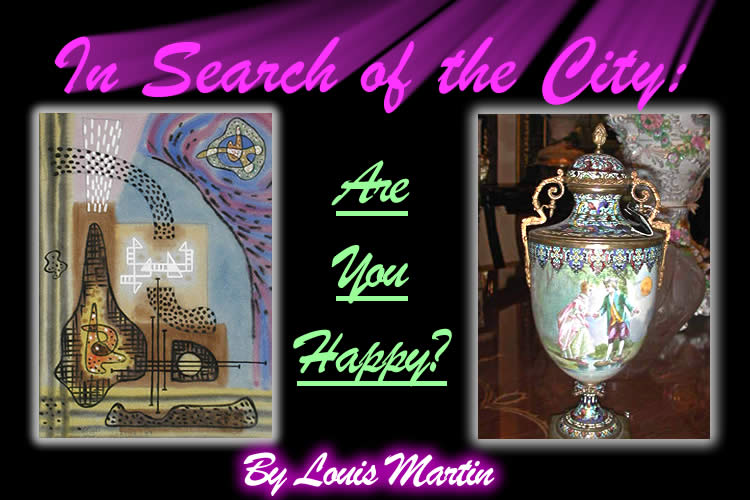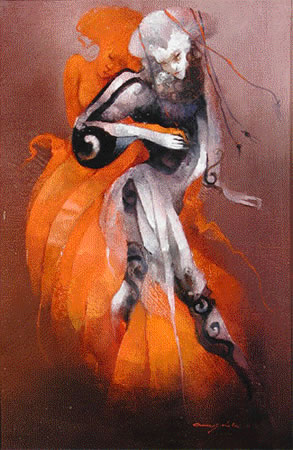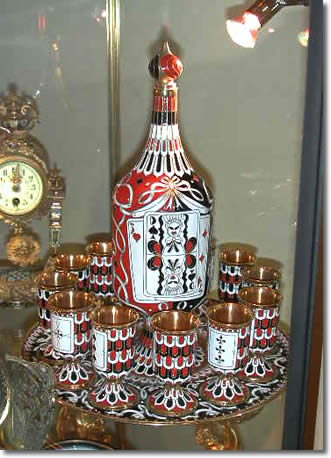Home | City Notes | Restaurant Guide | Galleries | Site Map | Search | Contact

Ni goaxing ma? (Are you happy?), I asked my Chinese friend.
Ni goaxing, wo goaxing (You happy, I happy), she said.
 What
a novel idea, I thought. We were over at the Laurel Court bar at the
Fairmont Hotel sipping Martinis and listening to Eric Shifrin play
a lovely medley of oldies—"Deep Purple," "Darn
That Dream," "Diamonds
Are a Girl's Best Friend," "All the Way," "Besame
Mucho" ...
What
a novel idea, I thought. We were over at the Laurel Court bar at the
Fairmont Hotel sipping Martinis and listening to Eric Shifrin play
a lovely medley of oldies—"Deep Purple," "Darn
That Dream," "Diamonds
Are a Girl's Best Friend," "All the Way," "Besame
Mucho" ...
She gave me a little kiss.
"I'm very happy," I said.
"I very happy too," she cooed. She had been holding my hand but now began to stroke my palm with one of her fingers.
I think Eric also played a song called "Died and Gone to Heaven in San Francisco" but I might be wrong about that.
The next day I was over at North Beach Restaurant and mentioned this "I happy, you happy" thing to Nat, the newly-arrived bartender from New York City. He agreed that it was a different perspective.
"You unhappy, I happy" or "You very unhappy, I very very happy." We agreed that most of our relationships with women could be characterized along those lines, with the women happy to the degree that she had made her guy miserable.
In fact it had been ages since any girlfriend had even thought of asking the "You happy?" question.
I'm talking about girlfriends of "European" descent here versus Asian "you happy" girlfriends. Nat was quick to point out that this "you happy" thing could be phony as hell—as a New Yorker he prides himself on being blunt but is slowly transitioning to a softer, fog-city style—but even if it was phony, we both agreed it was refreshing.
Feelings, those delicate little intractable sensations of pleasure, delight, or displeasure and chagrin, they still seem to matter. As much as we try, or others do, they just can't be destroyed. Live in the brain as much as you try, the brain leads back to sensation somewhere; and though the sensation may not be a bread-winning, big-time money earner like the brain, make the sensation unpleasant enough and the brain shuts down, just refuses to do its work, period.
"You're driving me nuts," I told a friend one time, and I watched a look come over her face of total satisfaction, of mission accomplished, of job well done.
Six months of misery followed until we broke up. I suppose it is the other way around too, with the guys doing all the "you unhappy, I happy" stuff, but this is my experience.
Talks about feelings. I was down
at one of the art galleries the other day and got a somewhat cold treatment
by one of the sales reps. I had stated the obvious awhile back, namely
that going into the downtown galleries could be a lot like walking into
one of the fancy auto dealerships over on Van Ness where the name of the
game is aggressive salesmanship. Try it; you'll see that this is a true
statement.
But please note: You will experience none of this type of aggressive behavior at the fine Weinstein Galleries, where the sales reps are knowledgeable professionals of the highest calibre.
Now consider this: Ever been hounded by a poet to buy a poem? Or let us say a poetry salesman to buy a poem? No, of course not. A poem is not like a piece of furniture. It just can't be sold that way. If it could, you bet you'd be hounded when you went into Borders by some guy in a suit & tie following you around asking you what kind of poems you have in your "little collection" and what you might be interested in adding. "Some Elliot, some Joyce, some Andre Breton? Ever read Tristan 'dada dada' Tzara? Solid investment, only headed up." And you'd have to back him off with a stick if you wanted to browse the bookshelves in peace.
But art is another matter. It, like a sofa, a couch, a lamp, or a chair, has physical presence, shape, and form, and is highly marketable. Also, it can be shown off, and owning a particularly fine piece brings status to its owner. True, you cannot drive it down the street but nor can you bring your car in the living room. Owning a piece of fine art is as simple as this: "Because I own a Chagall or a Picasso, I am better than you." One never says this out loud; no, that would be crude. But it is the unstated notion that matters, the inner voice that says,"I am big, you are small. I am great, you are a Chagalless, Picassoless nothing."
As I was saying, I got a bit of the cold shoulder but was not shown the door. In fact we ended up talking about it. The problem was one of sensitivity. Like the dentist probing a cavity, I had gotten too close to a nerve. The particular rep had a particular sensitivity to the comparison. Maybe I would too if I were in his position. When I pointed out that some of the reps were like that, some not—in fact, that some are absolutely passionate about the art they sell, he loosened up a bit and we talked. While I could make fun of this attitude, I won't. The guy takes pride in what he does and reacted without seeing the context. Attack writers, I might do the same. My best advice in recent time—advice I gave to a young woman friend who is having big problems with a boyfriend of the "you unhappy, I happy" type—is, at the end of the day, laugh a little. If you are not happy, at least you won't be as unhappy. And tomorrow, who knows, maybe you will be happy and he will be gone, out the door, drinking in some miserable bar down the street sorry to have lost you. "I cried for you, now it's your turn ..." The guy is nothing but fenbiau.
While I was at the Weinstein Gallery I had a look around and found myself staring at three artists: Roberto Matta, Gordon Onslow Ford, and Anne Bachelier. Matta I had looked at before. His works look like fully-fleshed out versions of those primitive squiggles depicting the subconscious that you see in books by or about Karl Jung. When I look at Matta I always see little primitive characters walking around in a wet, cellular dream world.
The world of Gordon Onslow Ford is also dreamy but it is sharper, often filled with points of light, circles, and lines amidst the dream space. It is a more precise world. (See top left, Persons of the Prism, © Gordon Onslow Ford.)
Anne Bachelier, on the other
hand, is of the same "school" but presents something dramatically different in that her content is much more human-like, if not actually
human, and her colors are striking and vibrant. If you are feeling sluggish
and slow, she will pull you right out of that with her fantasy world of
intriguing characters. You may not feel happy but at least you will be
alive and feeling something. (Right, La Compagnie de l'Ombre,
© Anne Bachelier.)
different in that her content is much more human-like, if not actually
human, and her colors are striking and vibrant. If you are feeling sluggish
and slow, she will pull you right out of that with her fantasy world of
intriguing characters. You may not feel happy but at least you will be
alive and feeling something. (Right, La Compagnie de l'Ombre,
© Anne Bachelier.)
Talk about nervous. I stopped by Natavi's Antiques on Geary the other day after leaving one of the fine Weinstein galleries up the street. This is a totally different genre of stuff to fill your living space with and make your friends feel totally lower class. I think you only find such shops as Natavi's in San Francisco and other large cities. Certainly not in Cloverdale or Ukiah. I think the term is "collectibles", though the beautiful gold-embossed card for Natavi Nadi, president of Natavi's, calls it "fine art." Fine art, I believe, is what is up the street at Weinstien and other galleries. What is tightly packed into the space at Natavi's looks like it came out of the parlor of a rich Russian count before the revolution when he was taken out and shot. Hand-painted porcelain, silver samovars, little painted cups on gold platters with decanters, tall craning urns ... In short, every manner of gleaming object to make your living room sparkle and outsparkle your guest's is there and so tightly packed into the space of the store that one false move and you will be knocking something over and paying for it.
But actually on the day I was there it was Nadi himself who was knocking things over. A lovely decanter in a glass case caught my attention. Had there been no decanter in the case, the case itself would probably have caught my attention. But things are relative, and it was the decanter that got my eye. It was solid silver, gold plated, and decorated with a design of playing cards in red, white and blue enamel. It was on a lovely platter, also of silver and gold-plated with the same design, and it came with twelve little cups. On the shelf above it in the same case was a lovely coffee urn with cups on a platter, all solid silver and gold-plated with a blue and pink and green floral design. My heart leapt at the sight of such treasures, then teetered on the verge of depression when I thought of my own Melita coffee pot and its throw-away paper filters.
 When
I asked Nadi the price of the decanter—there was no one else
in the store but an older sales person who looked like he might have
been Nadi's aging uncle—he became nervous and fluttery. His
voice seemed to tremble as he told me it was $14,000 but said we could
make a deal if I wanted the coffee set as well. I furrowed my brows
and was noncommittal.
When
I asked Nadi the price of the decanter—there was no one else
in the store but an older sales person who looked like he might have
been Nadi's aging uncle—he became nervous and fluttery. His
voice seemed to tremble as he told me it was $14,000 but said we could
make a deal if I wanted the coffee set as well. I furrowed my brows
and was noncommittal.
"Very fine work," said Nadi. "I show you." His hands aflutter, he opened the case and started to remove the lovely platter when the decanter and cups shifted and the whole thing spilled inside the case.
The older man, who had been standing nearby, raised his eyebrows in alarm, as though to say, "You idiot. You complete stupid idiot. Now this moron does not buy and we don't pay the rent and we are as good as Mikhail Vasilyevich when he was stripped of his warm jacket and thrown out in the snow. You worthless, no good ..."
Nadi placed the decanter and the cups back on the platter and somehow maneuvered it out of the cabinet.
"I hope it's not damaged," I said softly. "I thought it rather a nice piece."
"No no no," said Nadi, as one might say to a gunman pleading for one's life. "See, Very strong. Yes yes yes, very strong," he said holding out one of the little cups for me to see.
I averted my eyes from the cup.
"I'll need to think about it," I said coolly.
Nadi winced as if he had been struck by an invisible hand. I think I heard his uncle groan behind me.
Somehow I didn't think that drinking my brandy from a $14,000 decanter and cup set was going to make me all that happy. What's more, my friends would probably think I had gone nuts. Well, that might be worth something.
I looked over a large French urn made of brass and painted in enamel with a courtly scene of a man in tight pants and ruffled collar with big ass bending over a woman who is sitting—they both wear powdered wigs. He seemed to pleading for a favor; she seemed to be still resisting. I did not think this would make much of an impression on my drinking buddies, decanter or no decanter.
Nadi looked downcast and his uncle, or whatever he was, scowled as I left the store. I suppose I should have felt sorry for them.
As I headed up Powell to the Gold Dust Lounge for a shot, I was guilty of feeling a little gaoxing.
Home | City Notes | Restaurant Guide | Galleries | Site Map | Search | Contact